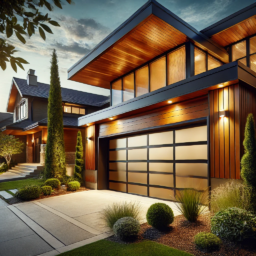Homeowners in Chatham, NJ need durable, reliable smart garage systems that stand up to coastal storms, winter freezes and spring thaws. This guide covers practical weatherproofing steps for the smart technologies and garage doors that protect your car, storage and mechanicals.
Why weatherproofing matters for smart garage systems
Smart garage systems add convenience — remote access, alerts and automation — but their electronic components and seals are vulnerable to water, wind and temperature swings common in New Jersey. Proper weatherproofing keeps sensors, motors and door panels working and prevents costly repairs to the rest of your home.
Assessing your garage for Chatham weather risks
Start with a quick inspection. Look for gaps, rust, frayed wiring, old weatherstripping and moisture stains. Pay attention to the bottom seal and side jambs; these are first-line defenses against cold drafts and spring rain.
Checklist: quick inspection tasks
- Check bottom seal compression and sun damage.
- Inspect weatherstripping on sides and top for cracks.
- Look for water pooling on the threshold or inside after heavy rain.
- Test sensors and keypad housings for secure, dry mounting.
- Note any rust on panels, hinges or tracks.
After the visual check, operate your smart garage systems through a full open/close cycle. Watch for unusual noises, slow response or sensor errors that indicate moisture intrusion or misalignment.
Practical weatherproofing solutions
Below are homeowner-friendly steps and when to call a pro. These tips work for older garage doors and modern smart garage systems alike.
Seals and thresholds
Replace worn bottom seals with a neoprene or rubber compression seal rated for cold climates. Add a threshold plate where water pools on the driveway to redirect runoff. Proper seals reduce drafts and lower heating bills for attached garages.
Protecting electronics and sensors
- Move exposed logic boxes and Wi‑Fi hubs higher on the wall away from splash zones.
- Use weatherproof enclosures with gaskets for keypads and outdoor sensors.
- Apply silicone dielectric grease to exposed terminal connections to prevent corrosion.
Insulation and panel upgrades
Adding insulation to door panels stabilizes interior garage temperatures, reducing condensation on electronics and prolonging battery life in sensors and remotes. If your door is older, consider upgrading to an insulated model designed for New Jersey winters.
Drainage and exterior fixes
- Grade the driveway so water flows away from the threshold.
- Clear gutters and downspouts near the garage to prevent overspill.
- Seal gaps between the garage siding and trim to keep wind-driven rain out.
Maintaining smart garage systems through the seasons
Regular maintenance keeps smart garage systems reliable year-round. Schedule seasonal checks in spring and late fall — before heavy rain seasons and before freezing temperatures arrive.
Spring maintenance
- Inspect and replace weatherstripping as needed.
- Test sensor alignment after winter heaving or ground movement.
- Clean tracks and lubricate rollers and hinges with a silicone-based lubricant.
Winter prep
- Ensure bottom seals are flexible; cold-cracked seals should be replaced.
- Protect exterior keypads and battery-powered sensors from extreme cold with insulated covers.
- Confirm remote access works in elevated humidity and cold conditions.
When to hire a residential service
Many weatherproofing tasks are DIY-friendly, but call a licensed residential service for any motor, opener electronics or structural repairs. Trained technicians can integrate weather seals without affecting balance, calibrate smart garage systems, and recommend insulated door replacements when appropriate.
For local expertise in Chatham, NJ, our technicians offer inspections and weatherproofing packages tailored to regional conditions. Learn more about common upgrades on our services page.
Costs, timelines and permits in Chatham
Weatherproofing costs vary by scope. Replacing seals and adding enclosures is typically an economical half-day job. Insulation or panel replacement can range higher and often requires a full day or two.
- New bottom seal: affordable, under a few hours labor.
- Sensor housing and small electrical weatherproofing: same-day service.
- Full insulated door replacement: one to two days; pricing depends on materials and opener integration.
Permits are rarely required for seal or sensor work in Chatham, but replacing structural components or altering electrical wiring might trigger a local permit. Check with the borough or ask our team via the contact page before major work.
Choosing materials and brands for NJ weather
Prioritize rust-resistant hardware, closed-cell seals and NEMA-rated enclosures for outdoor electronics. For smart garage systems, select open, well-documented platforms that tolerate intermittent moisture and allow secure firmware updates.
If you’re considering an upgrade, see our blog for detailed comparisons and seasonal tips: garage door and smart system advice.
Smart checklist for Chatham homeowners
- Annual inspection of seals, tracks and sensors.
- Move control electronics off the floor and into dry, enclosed mounts.
- Upgrade to insulated panels if condensation or freezing is recurring.
- Schedule professional tune-ups before winter and after major storms.
Smart garage systems bring convenience, but local weatherproofing preserves that convenience and prevents service calls. Whether you handle simple seal replacements yourself or book a full inspection with a residential service, proactive care in Chatham, NJ reduces downtime and keeps systems secure.
Frequently Asked Questions — Chatham, NJ
1. How does Chatham weather affect smart garage systems?
Cold winters can stiffen seals and shorten sensor battery life; heavy spring rains increase risk of water tracking into housings. Regular seal checks and waterproof enclosures protect electronics.
2. What is a reasonable timeline for weatherproofing a garage door?
Minor weatherproofing (seals, threshold, sensor housings) is often completed in a few hours. Door panel replacement and insulation typically take one to two days depending on opener integration.
3. Are permits required in Chatham for garage door upgrades?
Most seal and sensor upgrades do not require permits. Structural changes, electrical rewiring or permanent exterior modifications may need a borough permit—check with local officials or ask our team before work begins.
4. What price range should I expect for weatherproofing?
Expect modest costs for seals and enclosures (labor + parts). Insulating and replacing panels is higher—materials and smart opener integration factor into pricing. We provide local estimates for Chatham homes.
5. Do weatherproofing warranties cover smart components?
Warranties vary. Manufacturer warranties cover electronic defects; workmanship warranties from a residential service cover installation issues. Keep documentation for both when upgrades are performed.
Helpful local resources in Chatham, NJ
- Garage Door Repair Hoboken
- Garage Door Repair Montclair
- Garage Door Repair Westfield
- Garage Door Repair Summit
- Garage Door Repair Maplewood
- Garage Door Repair Livingston
- Garage Door Repair Short Hills
- Garage Door Repair Princeton
- Garage Door Repair Red Bank
- Garage Door Repair Morristown
- Garage Door Repair Chatham
- Garage Door Repair Mendham
- Garage Door Repair Bernardsville
- Garage Door Repair Bedminster
- Garage Door Repair Clinton
- Garage Door Repair Tenafly
- Garage Door Repair Ridgewood
- Garage Door Repair Upper Saddle River
- Garage Door Repair Wyckoff
- Garage Door Repair Basking Ridge
- Garage Door Repair South Orange
- Garage Door Repair Teaneck
- Garage Door Repair Fort Lee
- Garage Door Repair East Brunswick
- Garage Door Repair Montvale
- Garage Door Repair Haddonfield
- Garage Door Repair Marlboro
- Garage Door Repair Cranford
- Garage Door Repair Voorhees
- Garage Door Repair North Caldwell



